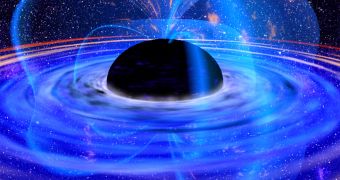Black holes are some of the most mysterious objects in the universe and one of the most interesting. They've been the subject of countless debates and are of great interest to astronomers and theoretical physicists alike.
This, while black holes haven't even been conclusively proven to exist, though we've seen many signs of their existence.
Among physicists, the interest in black holes exists because they challenge the limits of physics.
Neither classical physics and general relativity, nor quantum mechanics completely explain the phenomenon, yet black holes are some of the few macroscopic objects that are governed by both sets of laws.
One of the big question that has puzzled physicists for the past few decades is whether information contained in the particles and objects that have the misfortune of falling into a black hole is retained, even if nothing, not even light can escape the black hole.
Stephen Hawking famously claimed, in the 1970s, that information is irretrievably lost and that there is no way, not even in theory, to determine what happened to a black hole in the past from what can be measured or observed at present.
It wouldn't matter whether a star or a spaceship of the same mass entered a black hole, the two resulting black holes would be identical.
This violates one of the basic principles of physics which says that no information is ever lost in any of the processes that govern the universe.
Other physicists disagreed, notably John Preskill who made a bet with Hawking claiming that information is not lost in black holes. This was only recently settled with Hawkings conceding that information is not destroyed.
An explanation of how this could happen was provided by Leonard Susskind and Gerard 't Hooft in the form of the holographic principle with a string theory basis.
This was all well and good and accepted for more than a decade, until last year when the so-called "firewall paradox" was proposed, setting the theoretical physics world on fire.
This paradox showed that, for information to survive, anything falling into a black hole would have to be incinerated as soon as it passes the event horizon, the point of no return.
While the event horizon defines the point around a black hole at which gravity becomes so strong that the escape velocity is bigger than the speed of light, and thus nothing can escape, locally it's a portion of space like any other, there's nothing special about it.
What's more, the accepted theory is that nothing out of ordinary would happen to an object crossing the event horizon. This is known as the "no drama" scenario.
At the same time, most physicists now believe that information can escape a black hole, in some form, this is known as unitarity, the idea that information is always preserved in the universe.
Finally, there's the principle of normality, the idea that the laws of physics work the same at any point in the universe, including past the event horizon.
Notably, our understanding of the universe only works up to the singularity, the point inside a black hole where gravity becomes so great that normal physics breaks down.
The firewall paradox claims that all of these three principles can't all be true at the same time. This has to do with quantum mechanics and entanglement, perhaps the other most mysterious phenomenon in the universe apart from black holes.
Two entangled particles should remain entangled even if one crosses the event horizon. However, for information inside a black hole to be preserved, the particle left outside of the black hole would have to be entangled with a particle created via Hawking radiation just outside of the event horizon.
But according to quantum mechanics, a particle can't be entangled with two other particles in the exact same way at the same time.
This means that only two of the three principles can be true. If information is preserved, then the entanglement with the first particle is lost as soon as it crosses the event horizon. This breaking of the entanglement results in a release of energy, creating a wall of highly energetic particles, the firewall.
When the idea was first proposed, it seemed so ludicrous that most physicists thought it would be disproved easily. But a meeting of 50 of the biggest minds in physics late last year didn't result in a solution, which is why it's considered a paradox. Physicists love paradoxes because solving them more often than not means inventing new physics.
Now, a couple of physicists from the University of York have proposed a solution to the paradox which involves quantum information theory.

 14 DAY TRIAL //
14 DAY TRIAL //